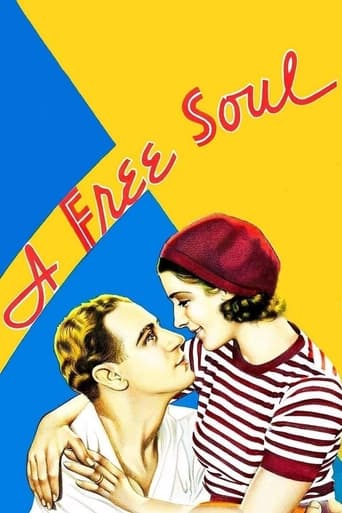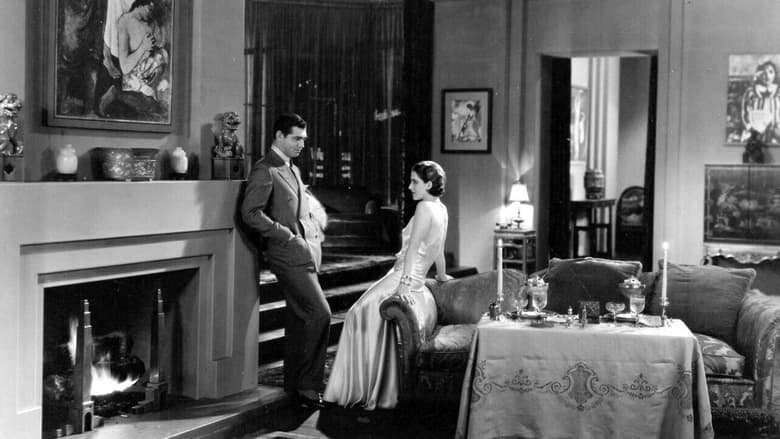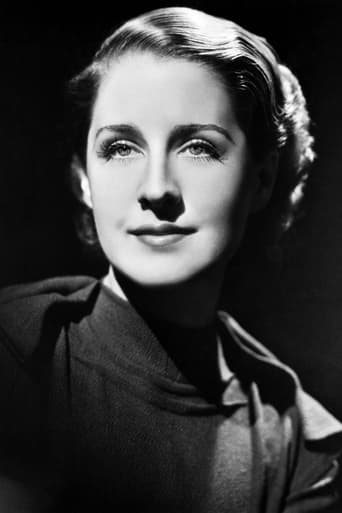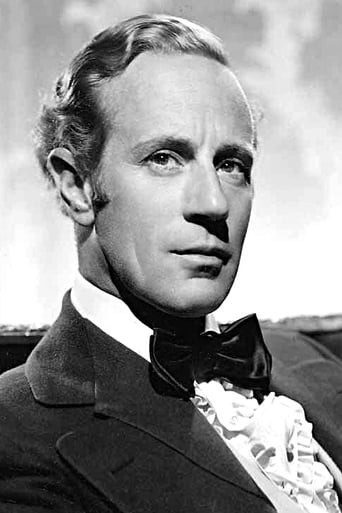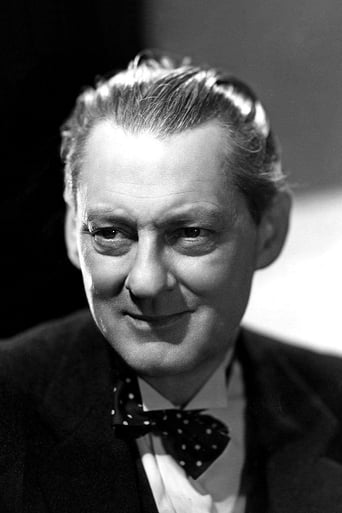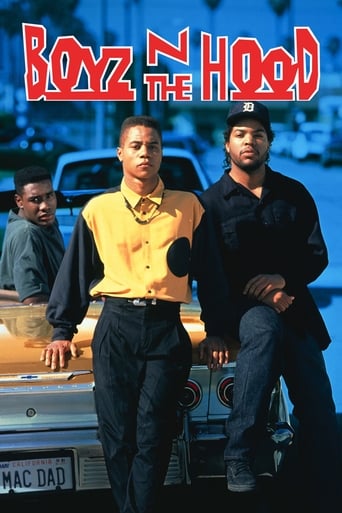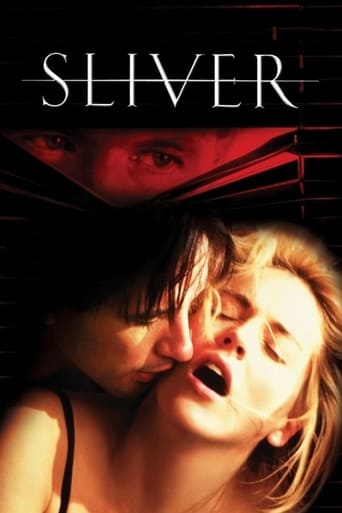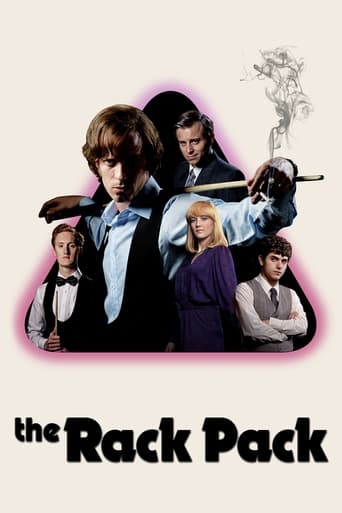A Free Soul (1931)
An alcoholic lawyer who successfully defended a notorious gambler on a murder charge objects when his free-spirited daughter becomes romantically involved with him.
Watch Trailer
Free Trial Channels
Cast


Similar titles
Reviews
What a waste of my time!!!
Overrated and overhyped
If the ambition is to provide two hours of instantly forgettable, popcorn-munching escapism, it succeeds.
There is, somehow, an interesting story here, as well as some good acting. There are also some good scenes
Copyright 3 June 1931 by Metro-Goldwyn-Mayer Distributing Corp. New York opening at the Astor, 2 June 1931. 10 reels. 91 minutes.SYNOPSIS: Society girl falls for a gangster.NOTES: Academy Award, Best Actor, Lionel Barrymore (defeating Jackie Cooper in Skippy, Richard Dix in Cimarron, Fredric March in The Royal Family of Broadway and Adolphe Menjou in The Front Page).Norma Shearer was nominated for Best Actress, but lost to Marie Dressler in MGM's Min and Bill. Brown was nominated for Directing, but lost to Norman Taurog (Skippy).Number nine in the 1931 Film Daily poll of U.S. film critics. Filmed on a 31-day shooting schedule, negative cost was $529,000. Initial net domestic rentals amounted to $773,000, leaving a tidy profit of $244,000 for the studio — plus the cream of overseas sales.MGM re-made this picture in 1953 as The Girl Who Had Everything with Elizabeth Taylor, William Powell and Fernando Lamas. The stage play opened on 12 January 1928 in Broadway's Playhouse Theatre and ran for 100 performances. Kay Johnson was the socialite, Lester Lonergan had the Barrymore part, and Melvyn Douglas played the gangster, Ace Wilfong. The director was none other than George Cukor.COMMENT: An odd film on many counts. (1) It's not stage-giggling Oscar-nominee, Norma Shearer, or even fulsomely theatrical Oscar- winner, Lionel Barrymore, who walks off with all the acting honors, but newcomer Clark Gable who effortlessly steals every scene in which he appears. And fortunately, they are many. Leslie Howard, by contrast, has only a small part. It's a key role, but, for some reason — maybe as a protest against the scene-chewing antics of Shearer and Barrymore (who are often abetted by James Gleason, who doesn't so much over- act as never fail to draw attention to himself) — Howard seems determined to underplay. It's only in his final brief scene with Gable and the long prison encounter with Shearer that he comes across forcefully and effectively. Gable, on the other hand, makes a solid impression right from the start. If anything, he gets more fascinating as the plot progresses as he strips away his initial surface veneer of ingratiating charm. (2) Clarence Brown, the distinguished director of The Eagle and The Goose Woman (both 1925), Flesh and the Devil (1926) and more than a dozen other captivating silents, seems to be even less at home with sound here than he was the previous year with Anna Christie. The choice of camera angles is often jarring, using intercut, ill-matching close-ups which serve to break up the rhythm of a scene rather than re-inforce it. He seems to have exercised little control over his players either, letting them do much as they like, and making no effort to integrate the various acting styles on offer. It's astonishing that Robert Z. Leonard, not exactly noted as the world's finest craftsman, did a much smoother and far more polished job with Shearer on The Divorcée (1929). And just two months after the release of A Free Soul, W.S. Van Dyke's supremely polished work with Barrymore on Guilty Hands (shot in half the time on a fraction of the budget) made Brown look like a rank amateur. (3) The script. Its trick opening creates a mood of uncertainty in the mind of a viewer, even if the implication of incest was meant to be taken seriously. Perhaps it was. Perhaps the whole point of the script is that the relationship between father and daughter was potentially or mentally incestuous even though no further physical contact than the hugging and cuddling we see on the screen actually took place. In this connection it's worth bearing in mind Barrymore's next assignment for Metro-Goldwyn-Mayer, W.S. Van Dyke's Guilty Hands, which, as previously mentioned, was released just two months later. In outline, Bayard Veiller's script bears remarkable similarities (even in minor details like its trick opening): Once again, Barrymore is a famous lawyer and once again he is determined to prevent his daughter (this time played by the lovely Madge Evans) marrying a scoundrel. But this time, there is absolutely no doubt that the Barrymore character's apparent concern for his daughter is plainly incestuous. (Guilty Hands, incidentally, is a far, far superior film on all counts than the comparatively tacky A Free Soul). (4) Despite Gable's saving performance, the overall impression the 2004 viewer takes away from A Free Soul, is that, aside from the Gable scenes, it's a creaky old melodrama, a museum piece typical of so-called "vintage" movies, almost laughable in its overdone theatrics. To me, it's a great shame that this wheezy, outdated, predictably plotted, impossibly outmoded "actors' holiday" is presented again and again on TV, whereas a contemporary masterpiece like "Guilty Hands" from the very same studio lies forgotten and neglected. Is Norma Shearer really that sublime an actress? To judge from her contrived performance here (and to a lesser extent in "The Divorcée") definitely not.
A Free Soul (1931)This is the movie that made a minor character actor into a romantic superstar. Famous defense attorney (and alcoholic), Stephen Ashe (Lionel Barrymore) is defending a murder suspect and gangster, Ace Wilfong (Clark Gable). An interesting "If the hat doesn't fit, you must acquit" causes Ace to get released. Here is where Ace meets Stephen's free-spirited daughter, Jan (Norma Shearer).Flighty Jan is bored with her nice-guy boyfriend, Dwight Wintrhop (Leslie Howard) and goes for the bad boy, Ace in a big way. The only problem is that Ace has fallen for Jan and when she wants to get out of the fling, Ace objects in a big way. To top that off, her dad, Stephen is hitting bottom with his drinking problem.Although, this isn't a great movie for Gable, his man-handling of Norma Shearer touched a nerve with females audiences that caused MGM to try to duplicate Gable's persona throughout the rest of his career.Unlike the legend that Gable's slapping Norma Shearer's character made him hot for the ladies (he actually only pushes her down on the couch), I think it was him telling her that he loved her and he wasn't going to let her go, that sealed the deal with his new found fans.
For decades I thought of this film as the one in which Clark Gable famously slaps Norma Shearer, inaugurating an era in rough loving that made women swoon at his brutality. I had read about this in numerous movie-history books and had even read that the studio was inundated with letters from women who wanted Gable to slap them. Well, nothing of the sort. Gable gently shoves Shearer onto a sofa, but that's it. The only slap is the one Shearer gives her father (Lionel Barrymore) when he is about to call her a tramp but before he can say the word. Somehow the slap, during the decades when the film went unseen, got transferred to Gable hitting Shearer. Don't believe everything you read!Another discovery on watching it was that much of the film is taken up not with the romance between the gangster and the Nob Hill lady but with Shearer's attempts to cure her father of alcoholism. Too much. Indeed, too much of these two altogether. Shearer, with her big nose and wonky eyes, was never a beauty, though she certainly carried on like one, with lots of arch, coy silent-movie mannerisms (head thrown back, back of hand covering face). Barrymore is, as usual, grade-B ham, getting sloppily sozzled and, when sober, full of maudlin pleas for sympathy.The legal aspect is laughable. The evidence that acquits Gable during the trial that begins the movie is so obviously absurd that this would have been discovered long before the trial began; also, it is not sufficient to be exculpatory on its own. In the trial at the end, legal procedure is violated or ignored, as anyone who has watched an episode of Law and Order--or perhaps even Perry Mason--can tell. The movie also wants to have the title both ways. Though we are frequently told that the Shearer character is over 21 (she looks older than her real age, 29) and has been brought up to be independent, we are also supposed to feel sorry for her because her father was weak and unable to protect her. Sorry, you can have only one verdict.Even so, the movie is well worth watching for occasionally snappy dialogue and its record of past manners and morals and for Adrian's fabulous, slinky gowns. Above all, for Gable, looking so beautiful, as he did in his other early movies, without the face fuzz. Amid all the phoniness, he is a real human being and a real man. Leslie Howard, too, is more interesting than the leads in his small and stereotypical part, making his character not merely a snobbish narrow-minded socialite but a man who is painfully and touchingly repressed. I presume the name of Gable's gangster--Ace Wilfong--is from the Adela Rogers St. John novel on which the film is based. If so, a pity that no one had the nerve to tell her this ludicrous combination of an aviator and a Chinese laundryman showed she wasn't so au fait with San Francisco low life as she thought.
A Free Soul (1931)Clark Gable says, "I'm telling you." And Norma Shearer, dressed in a sexy silk dress, replies, "Oh no, you're not. Nobody is."That sums up this astonishing movie. I can't believe A Free Soul is so little known, or that so many viewers don't get the depth of its meaning then...and now. Throw in three of the most amazing actors of the early 1930s--Lionel Barrymore, Clark Gable, and Norma Shearer--and you can't help be impressed, and moved, and intrigued. It's about strength of character (three or four characters, in fact). It's about being a modern person, and having modern problems. And it's about facing them, openly, honestly.So what holds it back? Well, for one thing, it has a lot of talk, a lot of simple dialog about some very not simple things. If you accept the characters and their need to talk, you will see a very honest confrontation with alcoholism, and with what is at first a kind of sex addiction, or what is later developed to be simply unbridled love for a man outside of marriage. But the parallel between two temptations is real, and rather powerful, and the sacrifices each of the two afflicted characters make is intense. Barrymore (as the one nipping the bottle) and Shearer (as the one too much in love, or in love with lovemaking) play their parts perfectly. They have moments of extraordinary clarity, and moments of abandonment. And they confront each other in a way that is completely reasonable.There are other aspects here worth at least lifting an eyebrow at, namely the very close relationship, almost as platonic lovers, between these two. Gable as a lovable but brutal and deceptive gangster is perfect, too--gorgeous and hard, charming and untrustworthy. The milieu is well developed, from barroom to hotel room to courtroom. This isn't a Warner Brothers knock-you-out crime film, it isn't even Three on a Match, for an example of a compromise between a woman's picture and a gangster flick. It's a heady drama, beautifully laid out and progressively involving, with director Clarence Brown (famous for a whole string of such interpersonal, romantic dramas over several decades) knowing what makes a film really matter.

